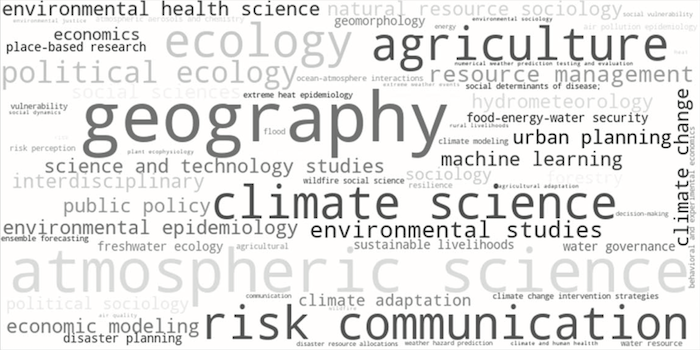
ASH, WILLIAMS – Connecting physical and social science datasets: challenges and pathways forward
Sameer Shah, Cassandra O’Lenick, Jessica Wan, Alexandra Ramos-Valle, Kevin Ash, Olga Wilhelmi, Catrin Edgeley, Maria Molina, Jessica Moulite, Carlo Andre Chunga Pizarro, Kelsey Emard, Olivia Cameron, James Done, Cleo Hazard, Thomas Hopson, Mikah Jones, Forrest Lacey, Michée Arnold Lachaud, Danica Lombardozzi, Michael Méndez, Rebecca Morss, Katharine Ricke, Fernando Tormos-Aponte, William Wieder, Christopher Williams
Article first published online: 13 September 2023
DOI: https://doi.org/10.1088/2515-7620/acf6b4
ABSTRACT: The integration of physical and social science data can enable novel frameworks, methodologies, and innovative solutions important for addressing complex socio-environmental problems. Unfortunately, many technical, procedural, and institutional challenges hamper effective data integration— detracting from interdisciplinary socio-environmental research and broader public impact. This paper reports on the experiences and challenges of social and physical data integration, as experienced by diverse Early Career Researchers (ECRs), and offers strategies for coping with and addressing these challenges. Through a workshop convened by the National Center for Atmospheric Research (NCAR) Innovator Program, 33 participants from different disciplines, career stages, and institutions across the United States identified four thematic data integration challenges related to complexity and uncertainty, communication, scale, and institutional barriers. They further recommended individual, departmental, and institutional scale responses to cope with and address these integration challenges. These recommendations seek to inform faculty and department support for ECRs, who are often encouraged—and even expected—to engage in integrative, problem-focused, and solutions-oriented research.
Read the full publication in Environmental Research Communications.